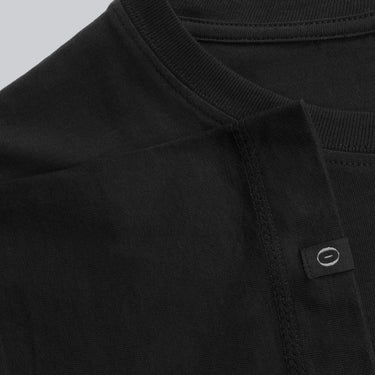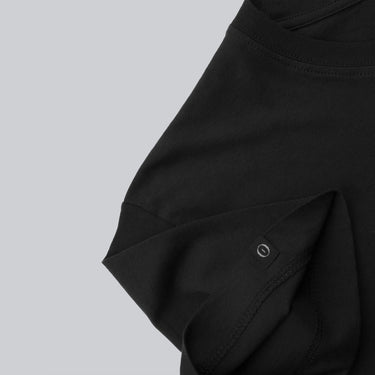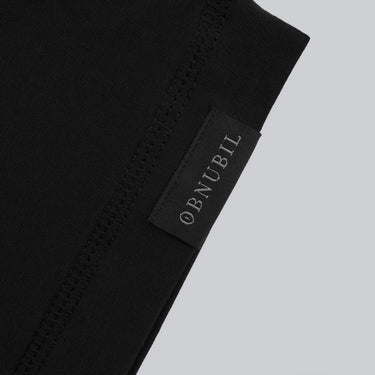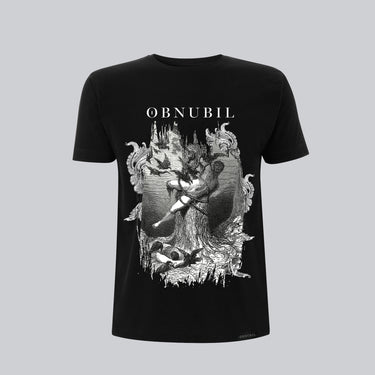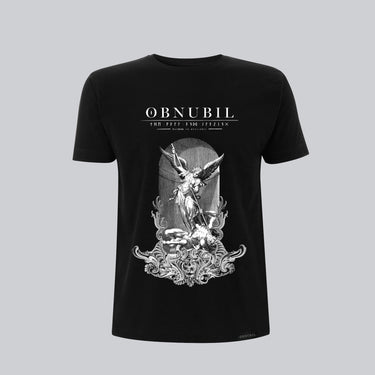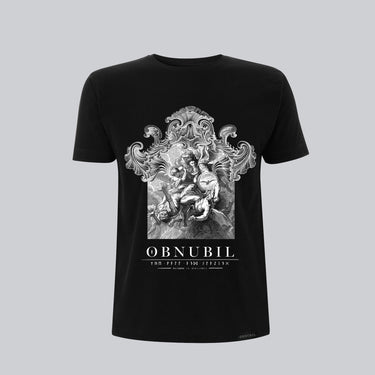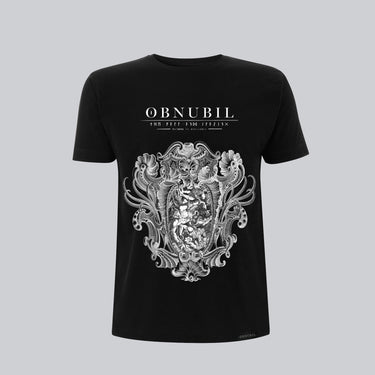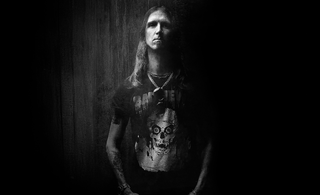
In this compelling conversation with Tobias Cristiansson, the driving bass force behind Necrophobic—and a respected presence across the Swedish extreme metal scene—we explore the intersection of passion, precision, and evolution in heavy music. From his early fascination with metal sparked by radio broadcasts like Rock Box to his formative teenage steps learning iconic riffs from Slayer and Metallica, Tobias reflects on a journey defined by curiosity and bold decisions. Over the years, his path has carried him through genre-defining eras with bands like Dismember and Grave, all while honing a distinct bass voice in Necrophobic. In our conversation, Tobias shares how he navigates the creative tension between honoring a band's legacy and planting his own fingerprints—whether by adding subtle flair or reinforcing sonic foundations. We also tap into his touring tales—from magical European tours with legends like Entombed and Obituary to the indispensable practicality of sleep, food, and finding moments of quiet in an otherwise chaotic life on the road. It’s the story of a musician who’s forged his own path through the shadows and lights of the extreme metal world.

INTERVIEW
OBNUBIL: Hi Tobias! Thanks so much for taking the time—it's a real pleasure to have this opportunity to speak with you. Before we dive into the depths of your work across Necrophobic, In Aphelion, and your many other ventures, I’d love to start on a more personal note. How’s life treating you these days, both on and off the stage? Are there any recent experiences—musical or otherwise—that have shifted your perspective or sparked new creative energy lately?
Tobias: Hi there! I'm doing fine, thanks. Here in Stockholm we have very warm summer weather at the moment but apart from these last days it has been quite rainy. For some reason that I don't know we in Necrophobic don't have that many gigs this summer. I don't know if it's because we have played frequently the last couple of years or why it's like this right now. Personally I find it utterly boring to not have gigs, instead of just sitting at home I much rather travel somewhere and play, that's my passion and what I enjoy most in life. I have however more time to practice bass playing and I have also recorded songs for a band that will release these tracks later on. I can't tell you what band it is at the moment but it will come out later this year or next year. It's always fun to be asked to play for others, I like to explore my musical horizons and I enjoy learning something new from every project that I have been involved in.
OBNUBIL: You’ve been part of some of the most iconic and intense bands in extreme metal, but every journey starts somewhere. Can you take us back to your earliest musical memories? What first pulled you toward music, and at what point did you realize this wasn’t just a hobby—but something you were going to build your life around? Were there any specific records, shows, or personal moments that lit the fire and set you down this path? I’d love to hear how those formative sparks helped shape the bassist and artist you’ve become today.
Tobias: From as far as I can remember my parents always had the radio on at home or played music on the stereo. My dad always talked about what artist we were listening to and maybe told an anecdote about that specific artist. I think that's a reason why I have an interest in music and bands and the people behind it. I got interested in metal music when I was 8 years old and there was a radio show in Sweden called Rock Box that I listened to every week. I recorded the songs that were played on cassette tapes, that built the foundation of music that I still love today. For years I was the only one with an interest in heavy music but when I was around 14 I started to have a few friends that also liked the same stuff. I also started to play bass when I was like 14-15 years old. I was asked to join a band in school because they thought I looked like a real hardrocker and fitted in because of that. I couldn't play anything but they said they would teach me as we went on. My first songs that I learned were from Slayer, Metallica, Megadeth, Black Sabbath, etc.
OBNUBIL: Your journey through the extreme metal underground spans decades, from the iconic tones of Dismember and Grave to the blackened atmospheres of Necrophobic and the more atmospheric edges of In Aphelion. Looking back, how has your personal identity as a bassist and musician evolved across these different sonic universes—and do you feel you’ve arrived at a point now where your current projects fully represent who you are musically, or is there still an itch to explore other territories, even outside metal?
Tobias: It has evolved throughout the years, I have always had the urge to learn and to explore although I wish that I had practiced more when I was a teenager. I started taking bass lessons when I was 20 years old and when I was 25 I went to a music school in Stockholm. I played all sorts of music at the classes such as funk, soul, pop. I had the opportunity to join Dismember back in 2005 and one month later we went on a tour in Australia. During my years with Dismember I didn't have a “normal” job, we just toured and played all the time which was great. In 2010 I joined Grave and we also toured a lot but I was having a full time job on the side which I still have. I spend all my vacation days on gigs. In Sweden we have like 4-5 weeks of paid vacation which is great. So I'm used to spending my vacation on gigs because at my job I'm working every second weekend. In 2021 I started to play with Necrophobic and I'm really happy to be in that band. We always have a great time when we are out playing and it's great to be on stage with those guys.
I have to approach every band and project differently depending on the music and what it requires. Since one year back I've been playing in a latin jazz band called Cahuac. It was formed by a friend of mine who is from Colombia, he is a piano player, singer and composer. It has been very learning to play that music and it's very different from what I have been doing before. There are tons of things that I would like to get better at regarding my playing and I will never run out of things that I want to improve.
OBNUBIL: You've played in bands that helped define both Swedish death metal and blackened death metal, often stepping into projects with strong established legacies. How do you approach joining such bands without becoming a shadow of their past, and instead manage to leave your own fingerprint on their sound—especially when replacing previous bassists with iconic status?
Tobias: I'm trying to go on a middle way where I'm honoring what has been in the past history of the band I'm playing with and also doing it my way. I like to believe that I have a personality both on stage and in my playing. If there's a part in a song where I feel that I can improvise or play something that's not on the record I try to do that without going too far off from what's already there. I feel that I have enough confidence in my playing to do that and the same goes for how I'm acting on stage. I know that some people will compare what I'm doing to what I was there before but that's not a thing I worry about. I know what I can bring to the table and if a band wants to have me there I think that they are also happy about it. Most of all I am just humbled and proud to be asked to continue a legacy of a band, that's not something that I take for granted.
OBNUBIL: Bass in extreme metal is often criminally underappreciated—yet when it’s done right, it carries immense weight and subtlety. You’ve developed a reputation for tasteful, muscular playing that supports but never disappears. Can you walk us through your philosophy of bass tone and presence in a genre dominated by blast beats and tremolo riffs? Do you see the role of the bassist as more of a structural pillar or as an undercurrent of its own poetry?
Tobias: Well, we bass players often end up behind a wall of distorted guitars, loud drums and screaming vocals, haha! So it's not that easy to be noticed in the midst of all that noise. Nowadays there are a bunch of bass players who really stand out, that's mostly in the more technical side of extreme metal and I'm not really that knowledgeable about that style of bands but I do like Steve DiGiorgio very much, he is an inspiration even though I can't play like him at all. When I have been playing in Grave it's all about the riffs, you have to think more about being the backbone and foundation and it's not possible to stray away too much from the actual guitar riff, I could do a few fills here and there or add some chords when it was needed. In Dismember I could add a bit of flavour to the more melodic parts and certainly in Necrophobic I have more space to come up with bass lines to back up the melodies. Even if I play just one note I try to make that note sound really good and classy. In Dismember I hardly used any distortion on the bass, it would just drown in the already super distorted guitar sound. With both Grave and Necrophobic I have been using a slightly more distorted sound but for me it's still important to keep the natural low end of the bass guitar there. The bass can lose the low frequencies if you add too much distortion. I like to add a bit of midrange that can make the bass sound stand out a little bit more. Generally I like to play freely in a song, if there's a part where I can add things and improvise I normally do that. When I play like I never really play the same things in those parts of the song. I might have a structure that I use but also adding what comes to mind just in the moment. That makes it more fun and challenging for me.
OBNUBIL: When you listen to the classic Swedish death metal tone from the early 90's versus the cleaner, more articulate production we often hear now, do you ever feel torn between the rawness of the old HM-2 glory days and the clarity of modern engineering? Where do you stand as a bassist who has lived on both sides of the sonic timeline?
Tobias: To be honest I'm quite bad with following new bands and music, and one reason for that might be that I find the production of metal bands of today lacking originality. It could be because before bands made their songs together in a room and later they recorded them together in a real studio maybe together with a producer. I think that kind of process makes the music more of a team effort even though there might be just one songwriter in the band, also because you record in a studio with mics the sound will be different from album to album even though it's recorded by the same members in the same studio. For example listen to the first Entombed albums or Iron Maiden or whatever band where each album has a unique sound. And I much rather listen to something where the tempo goes up and down and there might even be some flaws in the playing than to something that sounds perfect. I think there are so many metal bands that have a similar sound that I can't tell the difference between them. But I must add that I'm not a fan of recordings that sound like some garage band either, that's not what I'm aiming for either. Unfortunately there's not any money these days to spend too much time in a studio to record unless you are a bigger band. I appreciate bands like Opeth for example who go to a real studio and then they can also pull it off live. I'm not against backing tracks and click tracks per se but I prefer if a band can do without them. It can definitely be good to record to click tracks and use plug-ins for the guitar and bass but I think that it's important to find a personal sound if you do that. It's a good tool to use but you have to use it wisely. I guess I'm rooted too much in good old fashion rock n roll attitude when it comes to playing and recording music.
OBNUBIL: Bands like Necrophobic and In Aphelion channel a dark, spiritual atmosphere—one that transcends simple aggression. Do you personally engage with the esoteric, philosophical, or even mystical dimensions of black/death metal, or do you see it as more of a sonic art form than a belief system? Has your relationship to the "dark" side of metal changed over the years—become deeper, more symbolic, or even ironic in certain ways?
Tobias: When I was a teenager and started to dive into black metal my belief was that if you didn't believe in the lyrics you shouldn't play black metal either. I thought that you couldn't listen to black metal and be serious about it without really being 100 % about it. I played in a band when I was around 15-16 years old that sounded very much like the ongoing black metal scene but we thought that we couldn't call ourselves a black metal band because we were not satanists, we did not wear corpse paint and our lyrics were not satanic. I didn't walk around with an upside down cross round my neck just because I had too much respect for those who actually were into satanism for real. But nowadays I have changed my mind about the whole scene and I believe that there are actually not many bands where all the members are into what they are singing about anyway. And I don't care anymore either. I see myself as a musician and I play music. I'm not here to preach an ideology or certain views of life. When I'm on stage I see myself as an entertainer and a musician. I'm much more interested in the musical aspect of whatever I'm playing these days. I also think that black metal in general is more of a show anyway these days. My belief is that I don't believe in any higher power at all, I believe in myself and that people are responsible for their own actions and that it's important to treat others with respect.
OBNUBIL: You’ve been on the road with many bands, and with each lineup comes a different chemistry. Is there a particular tour or band chemistry that felt almost mystical—like everything aligned musically, personally, and atmospherically? Conversely, have you ever been in a situation where the music was perfect but the human dynamics off-stage made it a psychological challenge to keep going?
Tobias: I've been fortunate to be able to play around the world with some great bands. I still have a hard time believing it when I think about it really, I could never dream of that happening when I was young and started out playing music. I have never been in a band where the chemistry has been bad, there have been arguments but nothing severe. It can be hard sometimes when you are traveling for many hours, you have no privacy and lack of sleep. It's not everybody who enjoys that kind of life. I enjoy every bit of it, even traveling is fun for me but I definitely need my sleep. As long as I get food and sleep I have no problems being away. Every band has a different chemistry but generally it has all been good vibes. Of course I cherish those first moments that I had with Dismember when I was starting out. One really fun tour was back in 2006 when we did the “Masters of death” tour with Dismember, Entombed, Grave and Unleashed throughout Europe, it was a special tour for everyone involved. Another fun tour was when Grave toured with Obituary for 5 weeks in Europe in 2011, we all got along so well together and we had lots of parties together.
OBNUBIL: You’ve spent a huge part of your life on the road—from tiny clubs reeking of beer to massive festival stages echoing with chaos. What’s one moment from tour life that made you stop and think, “Yep… this is the weirdest job in the world”? Also, tour buses, cramped vans, lost baggage, and questionable backstage toilets—what’s your go-to survival strategy when everything goes wrong and you still have three more shows that week?
Tobias: When I've been on tour I like to take a walk away from the tour bus just to be able to see something else than the venues and the bus. The same goes if I'm at a festival, if it's possible I like to see something else than just the festival. Most of the time we don't have time to do that though. I think it's good to take everything as it comes, not all places can provide the same comfort in the venues, but it's important that you get proper food, it's kind of relevant if the band is going to be able to have energy to perform well. I have been to many gigs when things like food, backstage rooms, toilets are non-existent. Especially when I've been on tour in the USA the clubs there don't have backstage rooms, showers and even a toilet for the bands, and you don't get food either, you get some buy out money to take care of that yourself. So what you can do is that you can book a hotel room where all the band members and crew can take turns in taking a shower. I've also been taking ice cold showers in a dirty facility in the middle of the winter during some European tour. Flights have been cancelled, baggage has been lost, people have been piss drunk, etc. But it's all part of the game really, you just have to live with it when there's no other options. I know that people in smaller bands have experienced worse things than I have.
OBNUBIL: Are there certain cities or countries that feel like a second home when you're on tour? What is it about those places—audience energy, food, weird charm—that keeps pulling you back in? What’s your favorite non-musical part of touring? Any local food obsessions, off-day rituals, or strange souvenirs collected from random gas stations across Europe?
Tobias: The one that I always mention is Latin America, that would be from Mexico all the way down to Chile in South America. The crowd there is easily the best in the world. My favorite country is Colombia, I have been there many times both playing but especially as a private person. I was married to a girl from Colombia before so that's a country that has become close to my heart. I'm always up for trying local food, I want to experience the local culture as much as I can. A couple of years ago we arrived one day before our show in Nantes, France when we were playing Hellfest in 2022, we found the coziest little local restaurant where I had sea snails and some local red wine. Things like that can really make a fond memory for life. I have tons of nice memories and some of them can seem quite trivial but to me they are very nice. I collect magnets from all the countries that I have visited. I have quite a few but I'm hoping to expand my collection even more.
OBNUBIL: As someone who’s played with legendary figures and newcomers alike, what do you think younger musicians in the extreme scene sometimes misunderstand about the commitment, sacrifice, or mindset required to survive—let alone thrive—in this genre across decades? If you could hand them one hard-earned truth, what would it be?
Tobias: I think dedication is the key. And I think people that lack dedication will automatically drop off. Another important thing is of course talent. I see a lot of kids today that are really good at their instruments and that's really cool to see. Here in Sweden we have a new generation of bands with kids that are like 20 years old and that's really nice. They seem to have a lot of drive and dedication and I hope they will continue for a long time.
OBNUBIL: Looking back at your discography, are there moments—maybe specific songs, recordings, or even overlooked live performances—where you feel your playing or contribution was particularly meaningful but perhaps unnoticed by the wider audience? What do you secretly wish more people paid attention to in your career?
Tobias: As a bass player in the extreme metal context it's easy to get buried behind a wall of distorted guitars. I have sometimes played a lot of cool bass lines and then it's barely noticeable when the final mix and mastering is done, haha! One example being the latest Darkened album. But I have to say that I really love that album, its great songs and great production, I just wish that the bass could have been louder or whatever. But maybe that's just me. But I got a bass piece on that album that's called “Echoes of solitude” that I wrote. I think it turned out really beautiful, it has elements of classical music that I like.
OBNUBIL: If someone were to make a documentary titled The Bass Beneath the Blackened Sky: The Life and Strings of Tobias Cristiansson, what scene would you insist be included to fully capture your journey—not just as a musician, but as a human being who’s dedicated most of his life to this sound?
Tobias: Maybe that part when I was 14 years old and the guy in school told me that he wanted me to play bass in their band just because he thought that I looked cool and fitted the style of music that they played. I told him that I couldn't play but he said that they would teach me as we went along. That was such a pivotal moment for me. I don't know if I would have started to play in a band otherwise. I wanted to play but I didn't have anyone to play with or anyone to show me how to do it.
OBNUBIL: You’ve always got one foot in something intense—be it a thunderous new release or a powerful live show. What’s coming up next in your musical world? Are there any new albums, tours, collaborations, or perhaps even unexpected creative directions you’re particularly excited about? What should fans be keeping an eye—or ear—out for in the near future?
Tobias: We have a few gigs with Necrophobic coming up in the autumn of 2025, we are playing in Portugal, and also in London and then Istanbul. I'm looking forward to that and I'm hoping to play more gigs in the future. I'm continuing to play with my latin band and we have some shows coming up as well and we recently recorded a new song that will be released soon. I have recorded 5 songs for an EP with a band that will be out in the future. I'm always ready to engage in a new musical project if it's the right thing and if I have the time.
OBNUBIL: It’s truly been a pleasure hearing your insights and reflections—thank you for sharing so much of your journey. Before we wrap up, is there anything you’d like to say directly to the fans who’ve followed your work across so many bands over the years? Any last words or thoughts you'd like to leave with our readers?
Tobias: I'm humbled that people care about what I'm doing musically because that's not something that I take for granted so I want to say thanks to you for reaching out to me to do this interview. It's been a pleasure. I cant believe that I have been playing on this level for 20 years now, it's nothing but incredible. Continue to support the bands that you like and always strive to be a better human being. Thanks a lot. Cheers!
Interview done August 2025. Cover photo by Jens Rydén.



